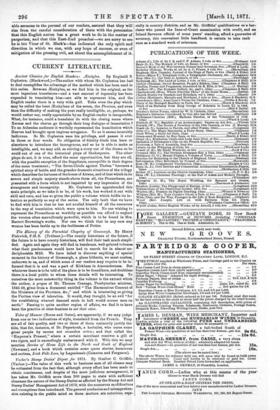CURRENT LITERATURE.
Ancient Classics for English Readers: ."Eschylus. By Reginald S. Copleston. (Blackwood.)—The author with whom Mr. Copleston has had to deal exemplifies the advantage of the method which has been used in this series. Between 2Eschylus, as we find him in the original, as the most ingenious translators—and a vast amount of ingenuity has been expended in translating him—are able to represent him, and the English reader there is a very wide gulf. Take even the play which may be called the least lEschylean of the seven, the Persians, and even then the difficulty of making the poet really intelligible, or, perhaps, we would rather say, really appreciable by an English reader is insuperable. What, for instance, could a translator do with the closing scene where Xerxes and the chorus go through their long dialogue of lamentation ? To an Athenian audience it worthily represented the humiliation which Heaven had brought upon impious arrogance. To us it seems incurably ludicrous. So Mr. Copleston uses his privilege, and passes it over in three or four words. No obligation of fidelity binds him here or elsewhere to introduce the incongruous, and so he is able to make as intelligible, and, we may add, as stirring a story out of the drama as he could out of one of the historical plays of Shakespeare. The other plays do not, it is true, afford the same opportunities, but they are all, with the possible exception of the Suppliants, susceptible in their degree of the same treatment ; " The Seven Chiefs against Thebes " becomes a spirited story of battle, and the grander dramatic situations of the trilogy which describes the fortunes of the house of Atreus, and of that which in its severe and simple majesty stands above them all, the Prometheus, are presented with a force which is not impaired by any impression of the
strangeness and incongruity. Mr. Copleston has apprehended this main principle, as we take it to be, of his work, has worked it out with skill and care, and has so given the public a volume which fulfils its in- tention as perfectly as any of the series. The only fault that we have to find with him is that he has not availed himself of all the resources in the way of translation which were open to him. No one wishing to represent the Prometheus as worthily as possible can afford to neglect the version often marvellously powerful, which is to be found in Mrs. Barrett Browning's works. Nor can we think that in any case any woman has been feeble up to the feebleness of Potter.


































 Previous page
Previous page